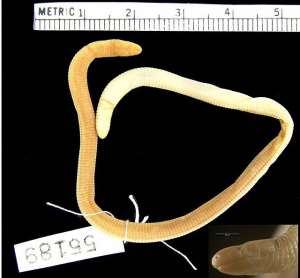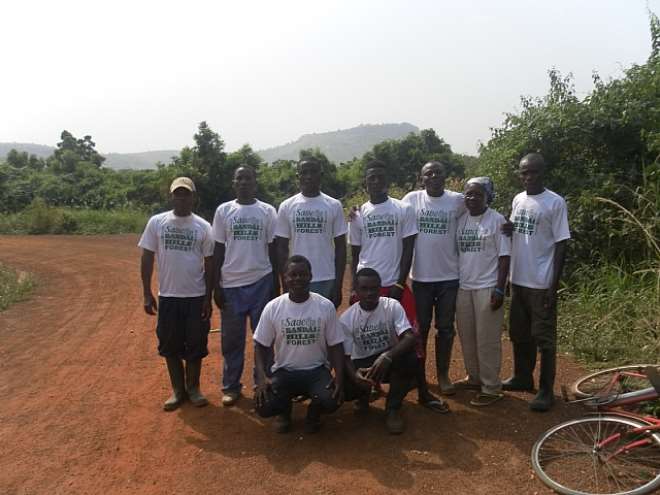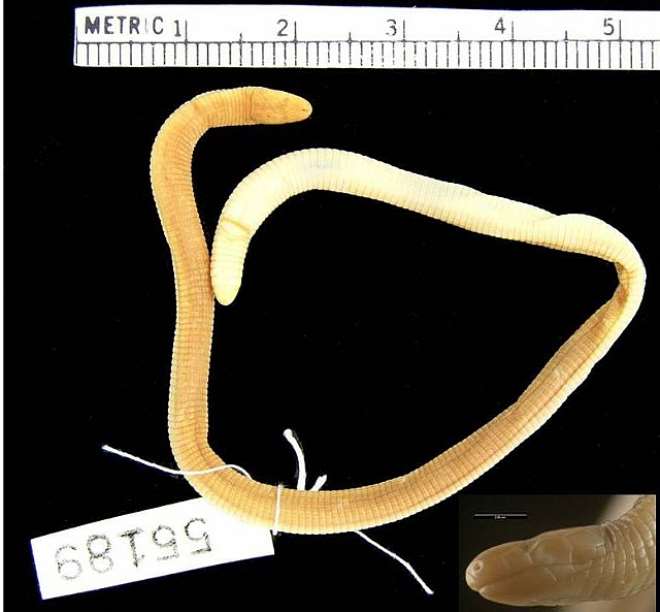
It took some of Ghana's leading scientists several months of intensive research, but a team of experts failed to find the Ghana Worm-lizard (Cynisca kraussi) in its only home at the Bandai Hills Forest Reserve. Since its discovery 135 years ago, scientists to date have found only two individuals of it; the second and last specimen turned up in 2005.
The rare and endemic reptile is known to be restricted to a small area of the Bandai Hills Forest Reserve in south-eastern Ghana. Given the magnitude of threats to its only home on earth—fires, cattle grazing and farming—the species is heading towards extinction. Miss Jacqueline Sapoama Kumadoh, co-project leader of the team of scientists says “Ghana is a key signatory to a number of international conventions on biodiversity including Convention on Biological Diversity (CBD), and is enjoined by such commitments to protect her natural heritage. It would be a bad image for us as a country if we allowed the worm-lizard that is unique to only Ghana to go extinct especially under the circumstance of sheer negligence.”
Gilbert Adum, a co-project leader and representative of the Cambridge Tropical Biology Association Ghanaian Alumni, also laments that “there is no forest anywhere in Ghana that is worst hit by deforestation like the Bandai Hills Forest Reserve. He claims more than half of the forest is already gone.
Large tracts of species habitats have been pulled down for the production of especially water melon, maize and tomatoes. The few remaining forested areas are also grazing grounds for cattle by Fulani herdsmen. On top of it, the herdsmen usually set the forest ablaze to create more grazing space and to quicken the growth of lush grass for their cattle. A local person reports “we have struggled with the Fulanis over years. It is not only your Ghana worm-lizard that has been “killed”, the Fulani herdsmen have even wounded and killed people here.”
The group is calling on the Forestry Commission and government to evacuate all Fulani herdsmen from the forest reserve. People who are also encroaching the forest to establish their farms must also be stopped immediately. Government itself has proposed a large hydroelectric dam in the area, but the group envisages this development in particular would wipe out completely the worm-lizard and other biodiversity unique this forest.
Dr. Caleb Ofori-Boateng, a scientist at FORIG and team member also calls on the International Union for Conservation of Nature (IUCN) to officially reclassify the Ghana Worm-lizard as Critically Endangered.
This project received funding from the Tropical Biology Association and Rufford Small Grants Foundation. The researchers would also like to acknowledge the support of Professor William Oduro, Head of KNUST Wildlife and Range Management Department; Dr Rosie Trevelyan, TBA Director and Dr. Markus Eichhorn, lecturer at Nottingham University, UK.
 GHANA WORM LIZARD PROJECT TEAM 2
GHANA WORM LIZARD PROJECT TEAM 2
 GHANA-WORM-LIZARD PHOTO
GHANA-WORM-LIZARD PHOTO




 NPP running mate was a difficult choice due to NAPO’s notorious public comments ...
NPP running mate was a difficult choice due to NAPO’s notorious public comments ...
 2024 election: We saw ‘failed’ Mahama’s past; Bawumia represents Ghana’s future ...
2024 election: We saw ‘failed’ Mahama’s past; Bawumia represents Ghana’s future ...
 ‘Talk is cheap, any crook or liar can come up with ideas’ – Fifi Kwetey blasts B...
‘Talk is cheap, any crook or liar can come up with ideas’ – Fifi Kwetey blasts B...
 Eurobond: This isn't an achievement; it's a disease, a taboo to even borrow — Kw...
Eurobond: This isn't an achievement; it's a disease, a taboo to even borrow — Kw...
 How you're treated while on the throne suggests you'll be miserable when you vac...
How you're treated while on the throne suggests you'll be miserable when you vac...
 You're insensitive — Akufo-Addo slammed for appointing Asante Bediatuo as Ambass...
You're insensitive — Akufo-Addo slammed for appointing Asante Bediatuo as Ambass...
 Sale of SSNIT Hotels: Akufo-Addo behind all state capture in the country — Ablak...
Sale of SSNIT Hotels: Akufo-Addo behind all state capture in the country — Ablak...
 Kumasi: Police officer killed in robbery incident at Ahodwo
Kumasi: Police officer killed in robbery incident at Ahodwo
 John Mahama donates GH¢50,000 to Buzstopboys
John Mahama donates GH¢50,000 to Buzstopboys
 Sale of SSNIT Hotels: Time to declare our own version of what occurred in Kenya ...
Sale of SSNIT Hotels: Time to declare our own version of what occurred in Kenya ...
